06 away动词短语-高中英语高频动词短语速记
文档属性
| 名称 | 06 away动词短语-高中英语高频动词短语速记 | 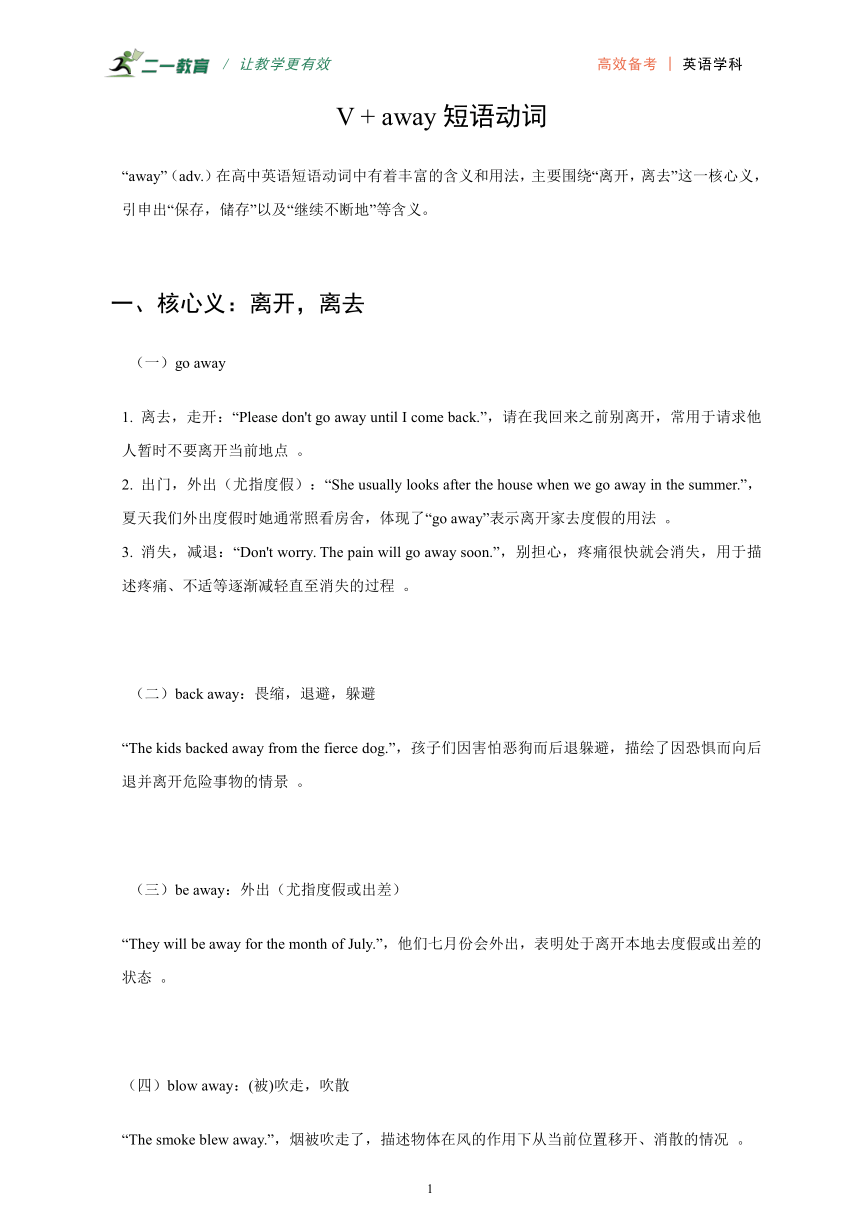 | |
| 格式 | docx | ||
| 文件大小 | 287.9KB | ||
| 资源类型 | 试卷 | ||
| 版本资源 | 通用版 | ||
| 科目 | 英语 | ||
| 更新时间 | 2025-04-29 16:21:26 | ||
图片预览

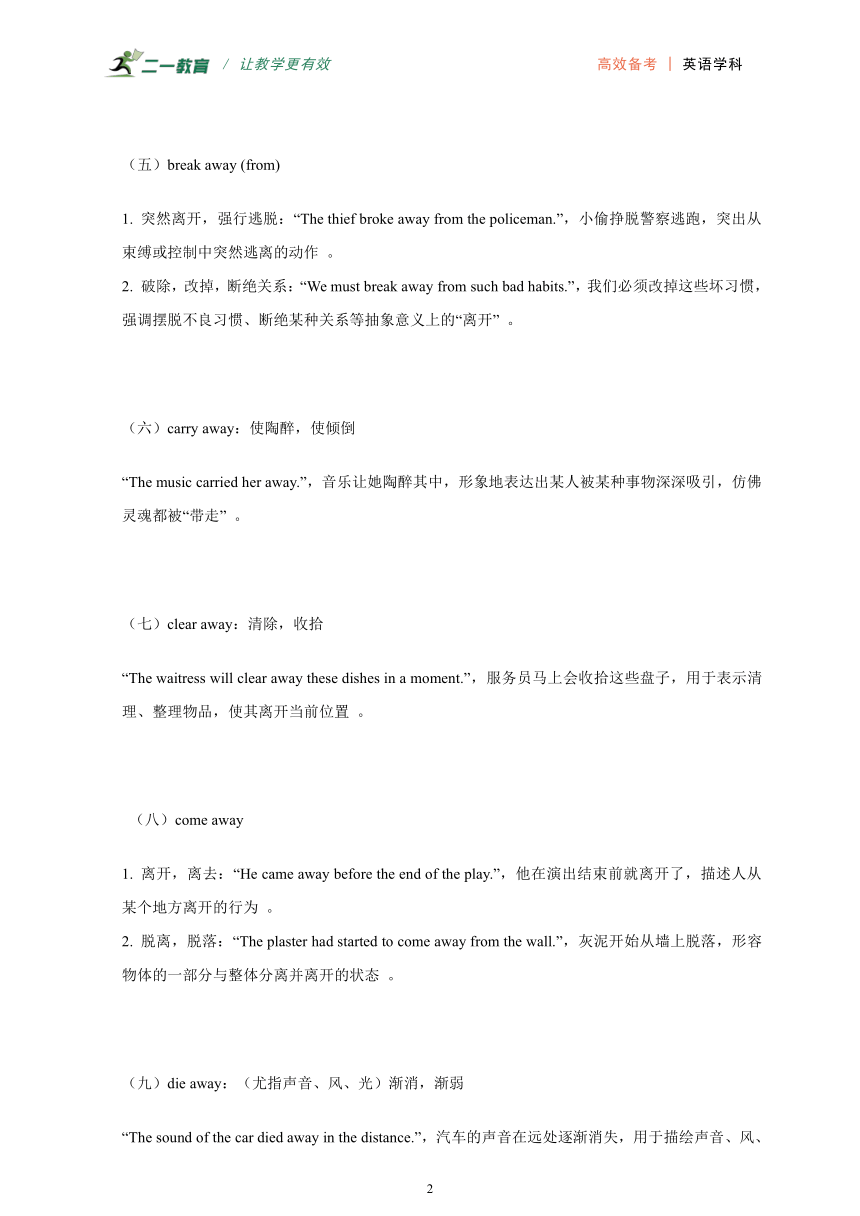
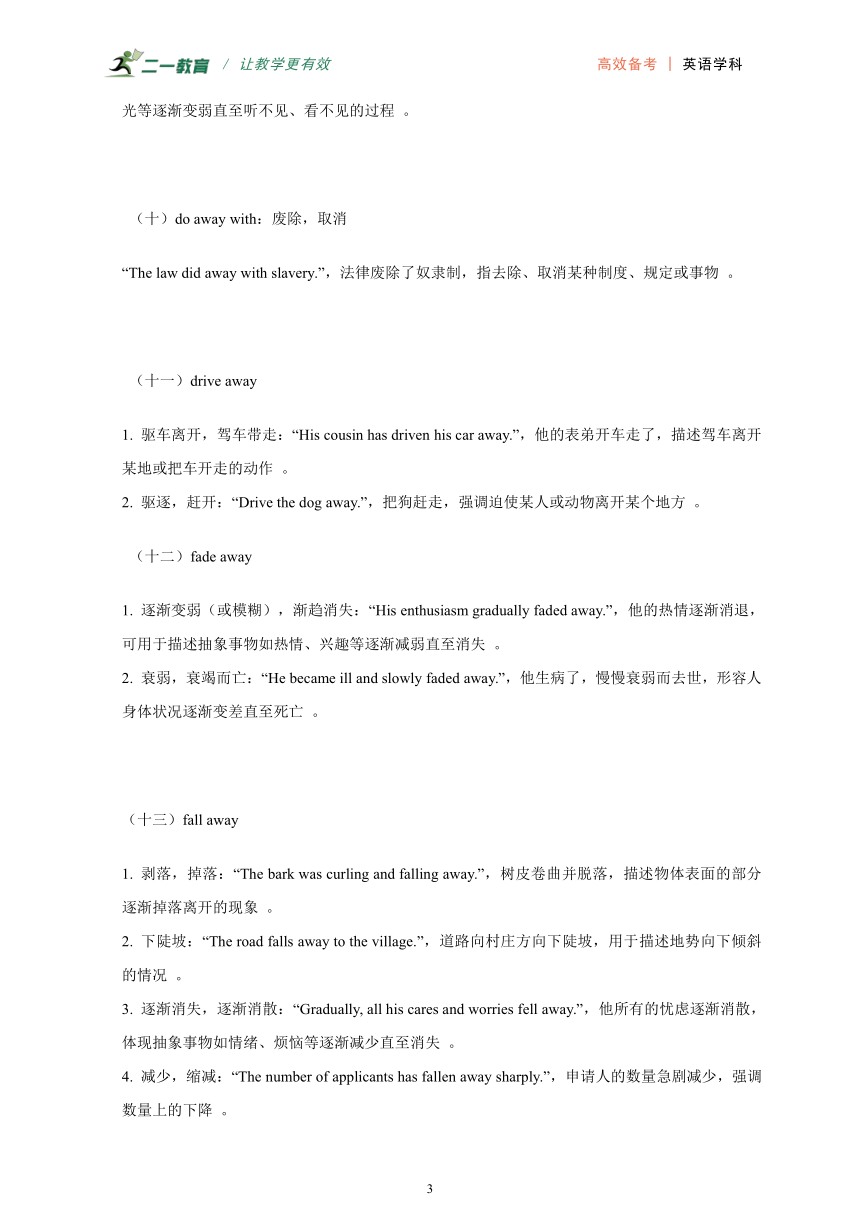
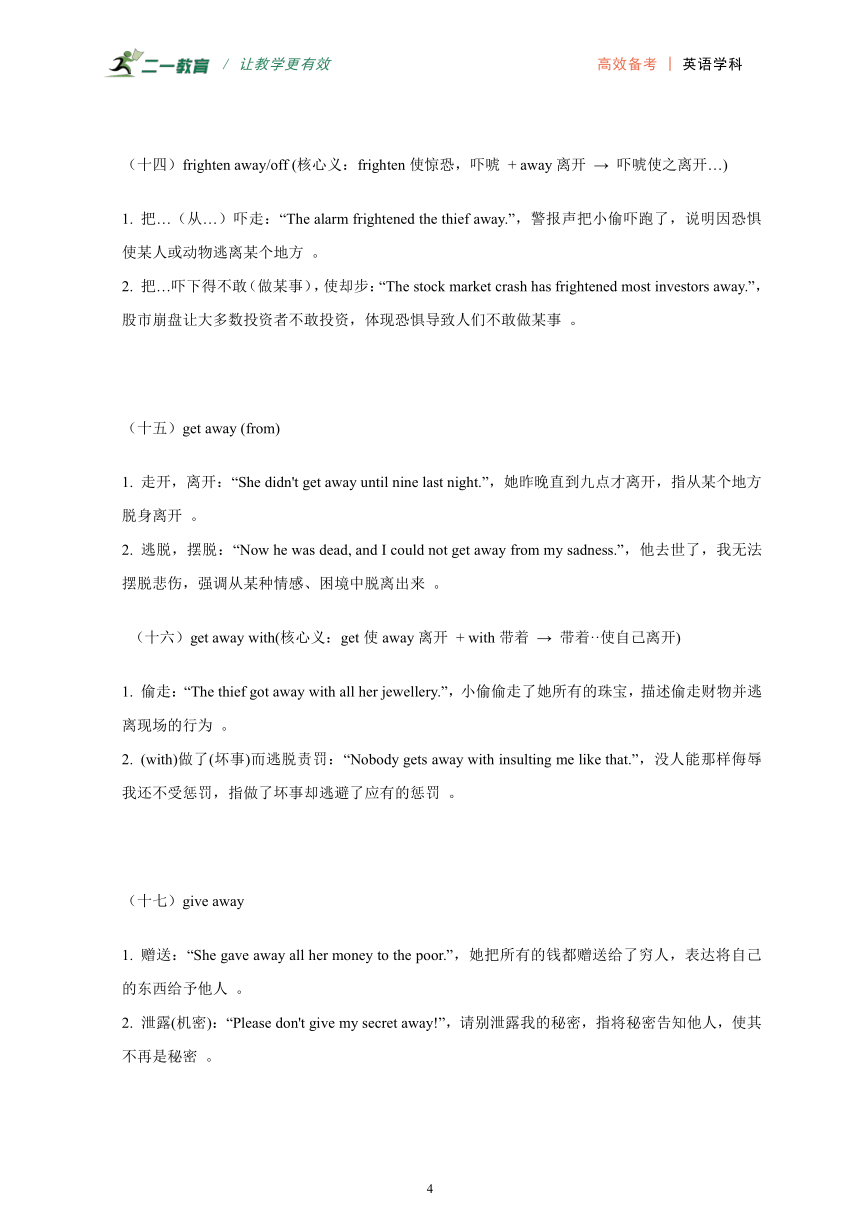
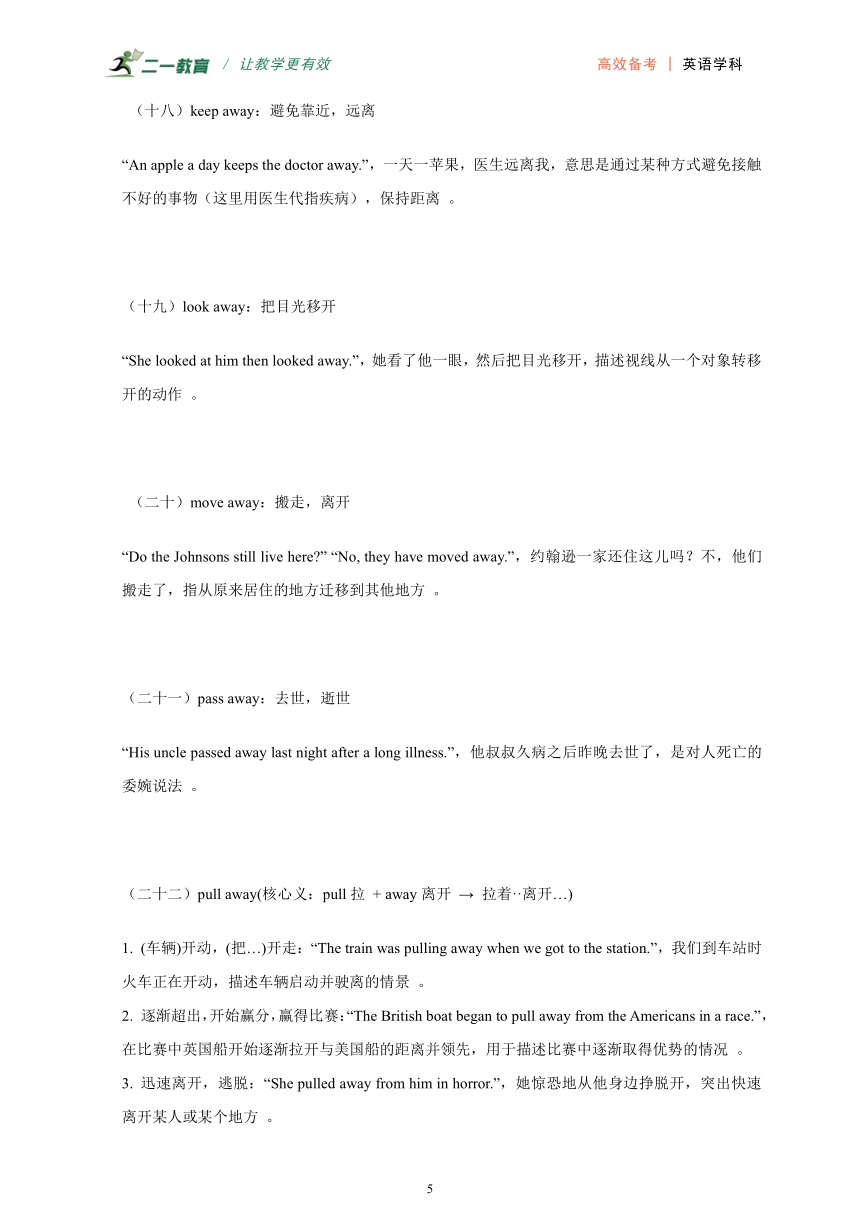
文档简介
/ 让教学更有效 高效备考 | 英语学科
V + away短语动词
“away”(adv.)在高中英语短语动词中有着丰富的含义和用法,主要围绕“离开,离去”这一核心义,引申出“保存,储存”以及“继续不断地”等含义。
一、核心义:离开,离去
(一)go away
离去,走开:“Please don't go away until I come back.”,请在我回来之前别离开,常用于请求他人暂时不要离开当前地点 。
出门,外出(尤指度假):“She usually looks after the house when we go away in the summer.”,夏天我们外出度假时她通常照看房舍,体现了“go away”表示离开家去度假的用法 。
消失,减退:“Don't worry. The pain will go away soon.”,别担心,疼痛很快就会消失,用于描述疼痛、不适等逐渐减轻直至消失的过程 。
(二)back away:畏缩,退避,躲避
“The kids backed away from the fierce dog.”,孩子们因害怕恶狗而后退躲避,描绘了因恐惧而向后退并离开危险事物的情景 。
(三)be away:外出(尤指度假或出差)
“They will be away for the month of July.”,他们七月份会外出,表明处于离开本地去度假或出差的状态 。
(四)blow away:(被)吹走,吹散
“The smoke blew away.”,烟被吹走了,描述物体在风的作用下从当前位置移开、消散的情况 。
(五)break away (from)
突然离开,强行逃脱:“The thief broke away from the policeman.”,小偷挣脱警察逃跑,突出从束缚或控制中突然逃离的动作 。
破除,改掉,断绝关系:“We must break away from such bad habits.”,我们必须改掉这些坏习惯,强调摆脱不良习惯、断绝某种关系等抽象意义上的“离开” 。
(六)carry away:使陶醉,使倾倒
“The music carried her away.”,音乐让她陶醉其中,形象地表达出某人被某种事物深深吸引,仿佛灵魂都被“带走” 。
(七)clear away:清除,收拾
“The waitress will clear away these dishes in a moment.”,服务员马上会收拾这些盘子,用于表示清理、整理物品,使其离开当前位置 。
(八)come away
离开,离去:“He came away before the end of the play.”,他在演出结束前就离开了,描述人从某个地方离开的行为 。
脱离,脱落:“The plaster had started to come away from the wall.”,灰泥开始从墙上脱落,形容物体的一部分与整体分离并离开的状态 。
(九)die away:(尤指声音、风、光)渐消,渐弱
“The sound of the car died away in the distance.”,汽车的声音在远处逐渐消失,用于描绘声音、风、光等逐渐变弱直至听不见、看不见的过程 。
(十)do away with:废除,取消
“The law did away with slavery.”,法律废除了奴隶制,指去除、取消某种制度、规定或事物 。
(十一)drive away
驱车离开,驾车带走:“His cousin has driven his car away.”,他的表弟开车走了,描述驾车离开某地或把车开走的动作 。
驱逐,赶开:“Drive the dog away.”,把狗赶走,强调迫使某人或动物离开某个地方 。
(十二)fade away
逐渐变弱(或模糊),渐趋消失:“His enthusiasm gradually faded away.”,他的热情逐渐消退,可用于描述抽象事物如热情、兴趣等逐渐减弱直至消失 。
衰弱,衰竭而亡:“He became ill and slowly faded away.”,他生病了,慢慢衰弱而去世,形容人身体状况逐渐变差直至死亡 。
(十三)fall away
剥落,掉落:“The bark was curling and falling away.”,树皮卷曲并脱落,描述物体表面的部分逐渐掉落离开的现象 。
下陡坡:“The road falls away to the village.”,道路向村庄方向下陡坡,用于描述地势向下倾斜的情况 。
逐渐消失,逐渐消散:“Gradually, all his cares and worries fell away.”,他所有的忧虑逐渐消散,体现抽象事物如情绪、烦恼等逐渐减少直至消失 。
减少,缩减:“The number of applicants has fallen away sharply.”,申请人的数量急剧减少,强调数量上的下降 。
(十四)frighten away/off (核心义:frighten使惊恐,吓唬 + away离开 → 吓唬使之离开…)
把…(从…)吓走:“The alarm frightened the thief away.”,警报声把小偷吓跑了,说明因恐惧使某人或动物逃离某个地方 。
把…吓下得不敢(做某事),使却步:“The stock market crash has frightened most investors away.”,股市崩盘让大多数投资者不敢投资,体现恐惧导致人们不敢做某事 。
(十五)get away (from)
走开,离开:“She didn't get away until nine last night.”,她昨晚直到九点才离开,指从某个地方脱身离开 。
逃脱,摆脱:“Now he was dead, and I could not get away from my sadness.”,他去世了,我无法摆脱悲伤,强调从某种情感、困境中脱离出来 。
(十六)get away with(核心义:get使away离开 + with带着 → 带着··使自己离开)
偷走:“The thief got away with all her jewellery.”,小偷偷走了她所有的珠宝,描述偷走财物并逃离现场的行为 。
(with)做了(坏事)而逃脱责罚:“Nobody gets away with insulting me like that.”,没人能那样侮辱我还不受惩罚,指做了坏事却逃避了应有的惩罚 。
(十七)give away
赠送:“She gave away all her money to the poor.”,她把所有的钱都赠送给了穷人,表达将自己的东西给予他人 。
泄露(机密):“Please don't give my secret away!”,请别泄露我的秘密,指将秘密告知他人,使其不再是秘密 。
(十八)keep away:避免靠近,远离
“An apple a day keeps the doctor away.”,一天一苹果,医生远离我,意思是通过某种方式避免接触不好的事物(这里用医生代指疾病),保持距离 。
(十九)look away:把目光移开
“She looked at him then looked away.”,她看了他一眼,然后把目光移开,描述视线从一个对象转移开的动作 。
(二十)move away:搬走,离开
“Do the Johnsons still live here ” “No, they have moved away.”,约翰逊一家还住这儿吗?不,他们搬走了,指从原来居住的地方迁移到其他地方 。
(二十一)pass away:去世,逝世
“His uncle passed away last night after a long illness.”,他叔叔久病之后昨晚去世了,是对人死亡的委婉说法 。
(二十二)pull away(核心义:pull拉 + away离开 → 拉着··离开…)
(车辆)开动,(把…)开走:“The train was pulling away when we got to the station.”,我们到车站时火车正在开动,描述车辆启动并驶离的情景 。
逐渐超出,开始赢分,赢得比赛:“The British boat began to pull away from the Americans in a race.”,在比赛中英国船开始逐渐拉开与美国船的距离并领先,用于描述比赛中逐渐取得优势的情况 。
迅速离开,逃脱:“She pulled away from him in horror.”,她惊恐地从他身边挣脱开,突出快速离开某人或某个地方 。
使离开,拉开:“I pulled him away from the edge.”,我把他从边缘拉开,指将某人或某物从某个危险或特定位置移开 。
(二十三)run away:走掉,跑掉
“She ran away and left her family.”,她离家出走了,描述人快速离开某个地方,通常带有突然、匆忙的意味 。
(二十四)run away with(核心义:run跑 + away离开 + with带着 → 带着…跑掉)
偷走,携…潜逃:“The thieves managed to run away with all her money.”,小偷们偷走了她所有的钱后潜逃,强调偷走财物并逃跑 。
与…私奔:“The writer has run away with his friend's wife.”,这位作家和他朋友的妻子私奔了,指与他人一起逃离原来的生活环境 。
(感情等)控制、支配(某人):“Her enthusiasm ran away with her.”,她的热情冲昏了头脑,说明某人的情绪或情感不受控制,支配了其行为 。
轻信、轻率地认为:“Don't run away with the idea that you can succeed without help.”,别轻易认为你可以不借助帮助就能成功,指轻易接受某种想法而未经深思熟虑 。
轻易赢得(比赛、奖品等):“He ran away with four first prizes.”,他轻而易举地赢得了四项一等奖,形容在比赛中轻松获得胜利或奖品 。
(二十五)scare away/off:把··吓跑,吓走
“The noise scared the birds away.”,噪音把鸟吓跑了,表明因害怕而使动物逃离 。
(二十六)send away
把…打发走:“Send them away. They are making a big noise.”,把他们打发走,他们太吵了,指让某人离开当前地方 。
开除,解雇:“He sent away his servant.”,他解雇了他的仆人,意味着将某人从工作岗位上赶走 。
(二十七)shut away:把··藏起来,隔离
“Mary shut herself away for a month to catch up on her academic work.”,玛丽把自己关起来一个月以赶学术作业,描述将人或物与外界隔离开来 。
(二十八)shy away from:(由于羞怯或恐惧)躲开,退缩,躲避,回避
“Her eyes shied away from mine.”,她避开了我的目光,体现因羞怯或恐惧而避免接触或面对某人或某事 。
(二十九)sign away:签字放弃
“She signed away her share in the property.”,她签字放弃了她在财产中的份额,指通过签字的方式放弃某种权利或利益 。
(三十)slip away
溜走,悄悄离开:“He slipped away before the end of the meeting.”,他在会议结束前悄悄溜走了,形容偷偷地、不引人注意地离开 。
(时间)不知不觉地流逝,飞逝:“Time is slipping away.”,时间在不知不觉中流逝,用于描述时间悄无声息地过去 。
(三十一)smooth away/out
使变平坦,整平:“The little boy tried to smooth those folds away.”,小男孩试图把那些褶皱抚平,指将不平整的东西弄平 。
消除(问题、困难等):“Her anxieties were quickly smoothed away.”,她的焦虑很快就消除了,用比喻的手法表示解决、消除问题或困难 。
(三十二)stay away:离开,不接近(危险、讨厌的人或事物),不沾染(某物)
“The police warned the people to stay away from the area.”,警方警告人们远离该区域,强调保持距离,避免接触危险或讨厌的事物 。
(三十三)sweep away
冲走,刮走,卷走:“The floods swept away all the houses.”,洪水冲走了所有的房屋,描述水流、风等强大力量将物体卷走、冲走的情景 。
消灭,彻底消除:“All doubts have now been swept away.”,现在所有的疑虑都消除了,用比喻的方式表示完全消除某种抽象的事物如疑虑、担忧等 。
(三十四)take away
拿走,带走:“These books must not be taken away from the library.”,这些书不能从图书馆带走,指将物品从一个地方移到另一个地方 。
减去,减掉:“Take away 2 from 4 and you get 2.”,4减2等于2,用于数学运算中表示减去某个数值 。
(三十五)tear away(核心义:tear撕 + away离开 → 撕开)
用力撕下,猛地拉掉:“Last night the storm torn all the leaves away from the trees.”,昨晚暴风雨把树上的叶子都扯掉了,形容用力将物体的一部分从整体上分离下来 。
(使)勉强离去,(使)依依不舍地停止:“How can I tear myself away from you ”,我怎么能舍得离开你呢?表达离开时的不舍之情 。
(三十六)throw away
扔掉,抛弃:“We threw our old furniture away when we won the lottery.”,我们中奖后把旧家具扔掉了,指丢弃不再需要的物品 。
错过(机会),浪费(金钱等):“He threw away his chances of success.”,他错过了成功的机会;“You're throwing your money away, buying such useless things.”,你买这些没用的东西是在浪费钱,用于描述错过机会或不合理地使用金钱 。
(三十七)trail away/off:声音逐渐减弱,缩小
“His voice trailed away to a whisper.”,他的声音逐渐减弱,最后变成了耳语,用于描绘声音逐渐变小的过程 。
(三十八)turn away(核心义:turn旋转 + away离开 → 把··旋转开)
转身不看,不理睬:“You shouldn't turn away from all your old friends.”,你不应该不理睬你所有的老朋友,指通过转身的动作表示不看或不理会某人 。
回绝,把…打发走:“He turned away the applicants.”,他拒绝了那些申请人,指拒绝某人的请求或把某人拒之门外 。
(三十九)walk away/off with
(在比赛中)轻易获胜,轻易赢得:“He walked away with the first prize at the school sports.”,他在学校运动会上轻松赢得了一等奖,形容在比赛中轻松取得胜利 。
顺手带走,偷走:“Somebody has walked away with my computer.”,有人偷走了我的电脑,指趁人不注意拿走别人的东西 。
(四十)wash away:冲走,冲垮
“The bridge was washed away in the storm.”,桥在暴风雨中被冲垮了,描述水流的力量对物体造成破坏并使其被冲走的情况 。
(四十一)wear away(核心义:wear磨损 + away离开 → 渐渐磨掉)
磨损,磨去:“The wind has worn the rocks away.”,风把岩石磨损了,指物体表面因长期摩擦、侵蚀而逐渐损耗 。
消磨,流逝:“The long day wore away.”,漫长的一天过去了,用于描述时间慢慢过去 。
(四十二)while away:消磨(时间),逍遥自在地度过
“I whiled away the time at the airport reading a novel.”,我在机场看小说打发时间,指以轻松的方式度过时间 。
(四十三)wipe away:擦去,抹掉(污渍、眼泪等)
“The girl wiped away her tears.”,女孩擦掉了眼泪,指用手或布等擦去脸上的泪水、污渍等 。
二、引申义:保存,储存
(一)put away
放好,收好:“Put your toys away in the box when you have finished playing.”,玩完后把你的玩具放进盒子里收好,指将物品放置到合适的位置保存 。
储存:“He has put away some money in the bank.”,他在银行存了一些钱,强调将钱等财物储存起来以备后用 。
(二)pack away:把...装起来
“Pack away your books, children. It's time for break.”,孩子们,把书收起来,该休息了,指将物品整理包装起来存放 。
(三)tidy away:收起(某物),放好
“Please tidy away before you leave.”,离开前请把东西收拾好,强调将物品整理整齐并放置到合适的地方 。
三、引申义:继续不断地
(一)burn away
不断地燃烧:“The forest fire burnt away for days.”,森林大火烧了好几天,描述火持续燃烧的状态 。
逐渐烧掉:“Half the candle had burnt away.”,蜡烛烧掉了一半,指物体在燃烧过程中逐渐损耗 。
(二)eat away:侵蚀,腐蚀
“Cancer ate away the health.”,癌症侵蚀着健康,形容疾病等慢慢损害身体或其他事物 。
(三)explain away:为...辩解
“How will you explain away the loss of two bicycles ”,你要怎么解释两辆自行车丢失的事呢?指不断地解释以消除疑虑或为错误、损失等辩解 。
hammer away at
努力做,致力于
词源逻辑:“hammer” 本意是 “锤击”,“away” 表示 “持续不断地”,“at” 指向某个对象,组合起来从 “在某事上持续不断地锤击” 引申出 “努力做” 的含义,就像持续用力锤击一样不断投入精力做事。
例句:在学习或工作中,面对困难任务时,我们可以说 “We should hammer away at this difficult project until we succeed.”(我们应该努力做这个困难的项目,直到成功 。)
反复强调,一再要求
词源逻辑:从 “在某话题上持续不断地锤击” 延伸而来,如同反复用锤子敲打,以引起注意,即 “反复强调,一再要求”。
例句:老师为了让学生记住重要知识点,可能会 “The teacher hammered away at the key points in the lecture.”(老师在讲课中反复强调重点内容 。)
talk away:不断地谈
词源逻辑:“talk” 是 “谈论”,“away” 表示 “持续不断地”,直接组合成 “不断地谈” 的意思 。
例句:朋友之间相聚时,可能会 “They talked away for hours, sharing their stories and experiences.”(他们聊了好几个小时,分享彼此的故事和经历 。)
toil away:辛勤地做 (困难或乏味的事)
词源逻辑:“toil” 有 “苦干,辛苦劳动,辛苦从事” 的意思,“away” 表示 “持续不断地”,从 “持续不断地苦干” 引申为 “辛勤地做(困难或乏味的事)” 。
例句:父母为了家庭付出很多,就像 “Our parents toil away day in and day out to provide a better life for us.”(我们的父母日复一日地辛勤劳作,为我们提供更好的生活 。)
waste away:日趋消瘦,日益衰弱
词源逻辑:“waste” 有 “损耗,消耗” 的含义,“away” 表示 “持续不断地”,从 “身体持续不断地消耗” 得出 “日趋消瘦,日益衰弱” 的意思 。
例句:当人生病或经历重大挫折时,可能会出现这种情况,如 “After the long term illness, he wasted away and became very weak.”(长期生病后,他日趋消瘦,变得非常虚弱 。)
work away:不断地工作
词源逻辑:“work” 是 “工作”,“away” 表示 “持续不断地”,直接表示 “不断地工作” 。
例句:为了完成任务,人们常常会 “He worked away all night to finish the report.”(他通宵工作以完成这份报告 。)
故事法巧记短语
故事一:神秘的森林宝藏
Once upon a time, there was a group of adventurous high - school students. They heard a rumor that there was a hidden treasure in the old forest on the outskirts of the town. One weekend, they decided to go and find it.
When they arrived at the forest, they started to look around carefully. Suddenly, a big, fierce - looking dog appeared. The kids backed away (畏缩,退避,躲避) in fear, but Tom, the bravest one, decided not to be scared away (把··吓跑,吓走). He picked up a stick and made some noise to drive away (驱逐,赶开) the dog.
As they walked deeper into the forest, they found an old, abandoned house. The door was half - open, and they could see some strange things inside. They decided to go in. When they entered, they saw a dusty table with a box on it. Tom was eager to open it, thinking it might be the treasure. But Jack stopped him, saying they should be careful.
Just then, the sound of the wind outside died away ((尤指声音、风、光)渐消,渐弱). They opened the box and found some old coins and a map. They believed the map was the key to finding the real treasure. They studied the map carefully and started to follow the directions.
However, on their way, they got lost. They tried to find the right path but couldn't. Some of the students started to worry, but Tom encouraged them to keep going. They walked for a long time until they came across a small river. The water was flowing fast, and they were afraid it might sweep away (冲走,刮走,卷走) their map.
Finally, they found a hidden cave. Inside the cave, they saw a big chest. They opened it and were disappointed to find that it was filled with old clothes. They realized they might have been tricked. But they still had a great adventure. They decided to take away (拿走,带走) the old coins as a souvenir and went away (离去,走开) from the forest, talking about their exciting experience all the way.
**中文翻译**:从前,有一群爱冒险的高中生。他们听说在小镇郊外的老森林里藏着宝藏。一个周末,他们决定去寻找宝藏。
到达森林后,他们开始仔细寻找。突然,出现了一只看起来很凶猛的大狗。孩子们吓得往后退,但最勇敢的汤姆决定不被吓跑。他捡起一根棍子,弄出声响把狗赶走。
他们往森林深处走去时,发现了一座废弃的老房子。门半开着,他们能看到里面有一些奇怪的东西。他们决定进去看看。进去后,他们看到一张满是灰尘的桌子,上面放着一个盒子。汤姆急切地想打开它,觉得里面可能就是宝藏。但杰克拦住了他,说他们得小心行事。
就在这时,外面的风声渐渐消失了。他们打开盒子,发现了一些古币和一张地图。他们相信这张地图是找到真正宝藏的关键。他们仔细研究地图,然后开始按照指示走。
然而,在路上,他们迷路了。他们试图找到正确的路,但找不到。一些学生开始担心起来,但汤姆鼓励他们继续前进。他们走了很久,直到遇到一条小河。水流湍急,他们担心河水会冲走他们的地图。
最后,他们找到了一个隐蔽的山洞。在山洞里,他们看到了一个大箱子。打开箱子后,他们失望地发现里面装满了旧衣服。他们意识到自己可能被骗了。但他们仍然经历了一次很棒的冒险。他们决定拿走古币作为纪念品,然后离开了森林,一路上都在谈论着这次激动人心的经历。
故事二:校园的意外事件
One sunny day at school, a group of students were having a great time in the playground. Tom was showing off his new football skills, and his friends were cheering for him.
Suddenly, a gust of wind blew away ((被)吹走,吹散) his cap. Tom ran after it, but it flew further and further. Just as he was about to catch it, a boy from another class picked it up. Instead of giving it back, the boy made fun of Tom and tried to run away (走掉,跑掉) with it.
Tom was angry. He chased the boy and shouted, "Give my cap away (归还)!" But the boy didn't listen. Tom was determined not to let him get away with (做了(坏事)而逃脱责罚) this. He ran faster and finally caught up with the boy. He pulled the cap away (用力撕下,猛地拉掉,这里指夺回) from the boy's hand.
The boy got angry too and pushed Tom. Tom almost fell down, but he quickly regained his balance. Some students around them started to gather, and the situation seemed to be getting out of control. The teacher, Mr. Smith, noticed the commotion and came over.
Mr. Smith asked what was going on. Tom explained everything. The boy tried to explain away (为...辩解) his behavior, saying he thought the cap was lost. But Mr. Smith didn't believe him. He told the boy that he should not have taken Tom's cap without permission and that he must learn to respect others' things.
After that, the boy apologized to Tom. Tom accepted the apology and put his cap away (放好,收好). The students learned a lesson from this incident. They realized that they should not take others' things without asking, and if they made a mistake, they should face it instead of trying to run away from it. The rest of the day at school went smoothly, and the students continued to play and study as usual.
**中文翻译**:在学校一个阳光明媚的日子里,一群学生在操场上玩得很开心。汤姆正在炫耀他新学的足球技巧,他的朋友们都在为他加油。
突然,一阵大风把他的帽子吹走了。汤姆追着帽子,但它飞得越来越远。就在他快要抓住帽子的时候,另一个班的一个男孩捡起了它。这个男孩不但没有归还帽子,还取笑汤姆,试图带着帽子跑掉。
汤姆很生气。他追着那个男孩喊道:“把我的帽子还我!” 但那个男孩不听。汤姆决心不让他就这么逃脱惩罚。他跑得更快,终于追上了那个男孩,并从男孩手中夺回了帽子。
那个男孩也生气了,推了汤姆一把。汤姆差点摔倒,但他很快恢复了平衡。周围的一些学生开始围过来,情况似乎要失控了。他们的老师史密斯先生注意到了这场骚乱,走了过来。
史密斯先生询问发生了什么事。汤姆把事情的经过解释了一遍。那个男孩试图为自己的行为辩解,说他以为帽子是没人要的。但史密斯先生不相信他的话。他告诉那个男孩,不应该未经允许就拿走汤姆的帽子,并且必须学会尊重别人的物品。
之后,那个男孩向汤姆道了歉。汤姆接受了道歉,然后把帽子收好。学生们从这件事中吸取了教训。他们意识到不应该未经他人允许就拿别人的东西,如果犯了错,应该面对错误,而不是试图逃避。在学校接下来的时间里一切顺利,学生们继续像往常一样玩耍和学习。
故事三:海边的奇妙假期
Last summer, Lily's family went away (出门,外出(尤指度假)) to the beach for a holiday. When they arrived at the beach house, they were all excited. Lily and her brother quickly put away (放好,收好) their luggage and ran to the beach.
The sun was shining brightly, and the sea was beautiful. Lily built a big sandcastle on the beach. But soon, a big wave came and swept away (冲走,刮走,卷走) her sandcastle. She was a bit sad at first, but then she decided to build an even bigger one.
While she was building the sandcastle, she saw a little crab moving around. She tried to catch it, but the crab was too fast and quickly slipped away (溜走,悄悄离开). Lily laughed and continued with her sandcastle.
Her brother was playing with a ball. He kicked the ball too hard, and it rolled into the sea. He was about to run into the water to get it when their mother stopped him. She said it was too dangerous. Just then, a kind man on a small boat picked up the ball and brought it back to them. Lily's brother thanked the man and put the ball away (放好,收好) carefully.
As the day went on, the sun started to set. The family sat on the beach, enjoying the beautiful sunset. Lily's father told some funny stories, and they all laughed away (不断地笑,这里表示开心地笑). Time seemed to pass quickly, and soon it was time to go back to the beach house.
Before leaving the beach, Lily and her brother tidied away (收起(某物),放好) their toys. They didn't want to leave a mess. Back at the beach house, they talked away (不断地谈) about their fun day at the beach. They were looking forward to more exciting things during the rest of their holiday.
**中文翻译**:去年夏天,莉莉一家去海边度假。当他们到达海滨别墅时,所有人都很兴奋。莉莉和她的哥哥迅速放好行李,就跑向了海滩。
阳光明媚,大海美不胜收。莉莉在沙滩上堆了一个大大的沙堡。但很快,一个大浪打来,冲走了她的沙堡。一开始她有点难过,但随后她决定堆一个更大的。
她在堆沙堡的时候,看到一只小螃蟹在爬来爬去。她试图抓住它,但螃蟹跑得太快,很快就溜走了。莉莉笑了笑,继续堆她的沙堡。
她哥哥在玩球。他踢球太用力,球滚进了海里。他正要跑向水里去捡球时,妈妈拦住了他,说那样太危险。就在这时,一个好心的人划着小船捡起球,把球送还给了他们。莉莉的哥哥谢过那个人,然后小心地把球收好。
随着时间的推移,太阳开始落山了。一家人坐在沙滩上,欣赏着美丽的日落。莉莉的爸爸讲了一些有趣的故事,他们都开心地笑个不停。时间似乎过得很快,很快就到了回海滨别墅的时候。
离开海滩前,莉莉和哥哥把他们的玩具都收拾好了。他们不想留下一片狼藉。回到别墅后,他们不停地谈论着在海滩度过的快乐一天。他们期待着在接下来的假期里有更多令人兴奋的事情。
21世纪教育网 www.21cnjy.com 精品试卷·第 2 页 (共 2 页)
V + away短语动词
“away”(adv.)在高中英语短语动词中有着丰富的含义和用法,主要围绕“离开,离去”这一核心义,引申出“保存,储存”以及“继续不断地”等含义。
一、核心义:离开,离去
(一)go away
离去,走开:“Please don't go away until I come back.”,请在我回来之前别离开,常用于请求他人暂时不要离开当前地点 。
出门,外出(尤指度假):“She usually looks after the house when we go away in the summer.”,夏天我们外出度假时她通常照看房舍,体现了“go away”表示离开家去度假的用法 。
消失,减退:“Don't worry. The pain will go away soon.”,别担心,疼痛很快就会消失,用于描述疼痛、不适等逐渐减轻直至消失的过程 。
(二)back away:畏缩,退避,躲避
“The kids backed away from the fierce dog.”,孩子们因害怕恶狗而后退躲避,描绘了因恐惧而向后退并离开危险事物的情景 。
(三)be away:外出(尤指度假或出差)
“They will be away for the month of July.”,他们七月份会外出,表明处于离开本地去度假或出差的状态 。
(四)blow away:(被)吹走,吹散
“The smoke blew away.”,烟被吹走了,描述物体在风的作用下从当前位置移开、消散的情况 。
(五)break away (from)
突然离开,强行逃脱:“The thief broke away from the policeman.”,小偷挣脱警察逃跑,突出从束缚或控制中突然逃离的动作 。
破除,改掉,断绝关系:“We must break away from such bad habits.”,我们必须改掉这些坏习惯,强调摆脱不良习惯、断绝某种关系等抽象意义上的“离开” 。
(六)carry away:使陶醉,使倾倒
“The music carried her away.”,音乐让她陶醉其中,形象地表达出某人被某种事物深深吸引,仿佛灵魂都被“带走” 。
(七)clear away:清除,收拾
“The waitress will clear away these dishes in a moment.”,服务员马上会收拾这些盘子,用于表示清理、整理物品,使其离开当前位置 。
(八)come away
离开,离去:“He came away before the end of the play.”,他在演出结束前就离开了,描述人从某个地方离开的行为 。
脱离,脱落:“The plaster had started to come away from the wall.”,灰泥开始从墙上脱落,形容物体的一部分与整体分离并离开的状态 。
(九)die away:(尤指声音、风、光)渐消,渐弱
“The sound of the car died away in the distance.”,汽车的声音在远处逐渐消失,用于描绘声音、风、光等逐渐变弱直至听不见、看不见的过程 。
(十)do away with:废除,取消
“The law did away with slavery.”,法律废除了奴隶制,指去除、取消某种制度、规定或事物 。
(十一)drive away
驱车离开,驾车带走:“His cousin has driven his car away.”,他的表弟开车走了,描述驾车离开某地或把车开走的动作 。
驱逐,赶开:“Drive the dog away.”,把狗赶走,强调迫使某人或动物离开某个地方 。
(十二)fade away
逐渐变弱(或模糊),渐趋消失:“His enthusiasm gradually faded away.”,他的热情逐渐消退,可用于描述抽象事物如热情、兴趣等逐渐减弱直至消失 。
衰弱,衰竭而亡:“He became ill and slowly faded away.”,他生病了,慢慢衰弱而去世,形容人身体状况逐渐变差直至死亡 。
(十三)fall away
剥落,掉落:“The bark was curling and falling away.”,树皮卷曲并脱落,描述物体表面的部分逐渐掉落离开的现象 。
下陡坡:“The road falls away to the village.”,道路向村庄方向下陡坡,用于描述地势向下倾斜的情况 。
逐渐消失,逐渐消散:“Gradually, all his cares and worries fell away.”,他所有的忧虑逐渐消散,体现抽象事物如情绪、烦恼等逐渐减少直至消失 。
减少,缩减:“The number of applicants has fallen away sharply.”,申请人的数量急剧减少,强调数量上的下降 。
(十四)frighten away/off (核心义:frighten使惊恐,吓唬 + away离开 → 吓唬使之离开…)
把…(从…)吓走:“The alarm frightened the thief away.”,警报声把小偷吓跑了,说明因恐惧使某人或动物逃离某个地方 。
把…吓下得不敢(做某事),使却步:“The stock market crash has frightened most investors away.”,股市崩盘让大多数投资者不敢投资,体现恐惧导致人们不敢做某事 。
(十五)get away (from)
走开,离开:“She didn't get away until nine last night.”,她昨晚直到九点才离开,指从某个地方脱身离开 。
逃脱,摆脱:“Now he was dead, and I could not get away from my sadness.”,他去世了,我无法摆脱悲伤,强调从某种情感、困境中脱离出来 。
(十六)get away with(核心义:get使away离开 + with带着 → 带着··使自己离开)
偷走:“The thief got away with all her jewellery.”,小偷偷走了她所有的珠宝,描述偷走财物并逃离现场的行为 。
(with)做了(坏事)而逃脱责罚:“Nobody gets away with insulting me like that.”,没人能那样侮辱我还不受惩罚,指做了坏事却逃避了应有的惩罚 。
(十七)give away
赠送:“She gave away all her money to the poor.”,她把所有的钱都赠送给了穷人,表达将自己的东西给予他人 。
泄露(机密):“Please don't give my secret away!”,请别泄露我的秘密,指将秘密告知他人,使其不再是秘密 。
(十八)keep away:避免靠近,远离
“An apple a day keeps the doctor away.”,一天一苹果,医生远离我,意思是通过某种方式避免接触不好的事物(这里用医生代指疾病),保持距离 。
(十九)look away:把目光移开
“She looked at him then looked away.”,她看了他一眼,然后把目光移开,描述视线从一个对象转移开的动作 。
(二十)move away:搬走,离开
“Do the Johnsons still live here ” “No, they have moved away.”,约翰逊一家还住这儿吗?不,他们搬走了,指从原来居住的地方迁移到其他地方 。
(二十一)pass away:去世,逝世
“His uncle passed away last night after a long illness.”,他叔叔久病之后昨晚去世了,是对人死亡的委婉说法 。
(二十二)pull away(核心义:pull拉 + away离开 → 拉着··离开…)
(车辆)开动,(把…)开走:“The train was pulling away when we got to the station.”,我们到车站时火车正在开动,描述车辆启动并驶离的情景 。
逐渐超出,开始赢分,赢得比赛:“The British boat began to pull away from the Americans in a race.”,在比赛中英国船开始逐渐拉开与美国船的距离并领先,用于描述比赛中逐渐取得优势的情况 。
迅速离开,逃脱:“She pulled away from him in horror.”,她惊恐地从他身边挣脱开,突出快速离开某人或某个地方 。
使离开,拉开:“I pulled him away from the edge.”,我把他从边缘拉开,指将某人或某物从某个危险或特定位置移开 。
(二十三)run away:走掉,跑掉
“She ran away and left her family.”,她离家出走了,描述人快速离开某个地方,通常带有突然、匆忙的意味 。
(二十四)run away with(核心义:run跑 + away离开 + with带着 → 带着…跑掉)
偷走,携…潜逃:“The thieves managed to run away with all her money.”,小偷们偷走了她所有的钱后潜逃,强调偷走财物并逃跑 。
与…私奔:“The writer has run away with his friend's wife.”,这位作家和他朋友的妻子私奔了,指与他人一起逃离原来的生活环境 。
(感情等)控制、支配(某人):“Her enthusiasm ran away with her.”,她的热情冲昏了头脑,说明某人的情绪或情感不受控制,支配了其行为 。
轻信、轻率地认为:“Don't run away with the idea that you can succeed without help.”,别轻易认为你可以不借助帮助就能成功,指轻易接受某种想法而未经深思熟虑 。
轻易赢得(比赛、奖品等):“He ran away with four first prizes.”,他轻而易举地赢得了四项一等奖,形容在比赛中轻松获得胜利或奖品 。
(二十五)scare away/off:把··吓跑,吓走
“The noise scared the birds away.”,噪音把鸟吓跑了,表明因害怕而使动物逃离 。
(二十六)send away
把…打发走:“Send them away. They are making a big noise.”,把他们打发走,他们太吵了,指让某人离开当前地方 。
开除,解雇:“He sent away his servant.”,他解雇了他的仆人,意味着将某人从工作岗位上赶走 。
(二十七)shut away:把··藏起来,隔离
“Mary shut herself away for a month to catch up on her academic work.”,玛丽把自己关起来一个月以赶学术作业,描述将人或物与外界隔离开来 。
(二十八)shy away from:(由于羞怯或恐惧)躲开,退缩,躲避,回避
“Her eyes shied away from mine.”,她避开了我的目光,体现因羞怯或恐惧而避免接触或面对某人或某事 。
(二十九)sign away:签字放弃
“She signed away her share in the property.”,她签字放弃了她在财产中的份额,指通过签字的方式放弃某种权利或利益 。
(三十)slip away
溜走,悄悄离开:“He slipped away before the end of the meeting.”,他在会议结束前悄悄溜走了,形容偷偷地、不引人注意地离开 。
(时间)不知不觉地流逝,飞逝:“Time is slipping away.”,时间在不知不觉中流逝,用于描述时间悄无声息地过去 。
(三十一)smooth away/out
使变平坦,整平:“The little boy tried to smooth those folds away.”,小男孩试图把那些褶皱抚平,指将不平整的东西弄平 。
消除(问题、困难等):“Her anxieties were quickly smoothed away.”,她的焦虑很快就消除了,用比喻的手法表示解决、消除问题或困难 。
(三十二)stay away:离开,不接近(危险、讨厌的人或事物),不沾染(某物)
“The police warned the people to stay away from the area.”,警方警告人们远离该区域,强调保持距离,避免接触危险或讨厌的事物 。
(三十三)sweep away
冲走,刮走,卷走:“The floods swept away all the houses.”,洪水冲走了所有的房屋,描述水流、风等强大力量将物体卷走、冲走的情景 。
消灭,彻底消除:“All doubts have now been swept away.”,现在所有的疑虑都消除了,用比喻的方式表示完全消除某种抽象的事物如疑虑、担忧等 。
(三十四)take away
拿走,带走:“These books must not be taken away from the library.”,这些书不能从图书馆带走,指将物品从一个地方移到另一个地方 。
减去,减掉:“Take away 2 from 4 and you get 2.”,4减2等于2,用于数学运算中表示减去某个数值 。
(三十五)tear away(核心义:tear撕 + away离开 → 撕开)
用力撕下,猛地拉掉:“Last night the storm torn all the leaves away from the trees.”,昨晚暴风雨把树上的叶子都扯掉了,形容用力将物体的一部分从整体上分离下来 。
(使)勉强离去,(使)依依不舍地停止:“How can I tear myself away from you ”,我怎么能舍得离开你呢?表达离开时的不舍之情 。
(三十六)throw away
扔掉,抛弃:“We threw our old furniture away when we won the lottery.”,我们中奖后把旧家具扔掉了,指丢弃不再需要的物品 。
错过(机会),浪费(金钱等):“He threw away his chances of success.”,他错过了成功的机会;“You're throwing your money away, buying such useless things.”,你买这些没用的东西是在浪费钱,用于描述错过机会或不合理地使用金钱 。
(三十七)trail away/off:声音逐渐减弱,缩小
“His voice trailed away to a whisper.”,他的声音逐渐减弱,最后变成了耳语,用于描绘声音逐渐变小的过程 。
(三十八)turn away(核心义:turn旋转 + away离开 → 把··旋转开)
转身不看,不理睬:“You shouldn't turn away from all your old friends.”,你不应该不理睬你所有的老朋友,指通过转身的动作表示不看或不理会某人 。
回绝,把…打发走:“He turned away the applicants.”,他拒绝了那些申请人,指拒绝某人的请求或把某人拒之门外 。
(三十九)walk away/off with
(在比赛中)轻易获胜,轻易赢得:“He walked away with the first prize at the school sports.”,他在学校运动会上轻松赢得了一等奖,形容在比赛中轻松取得胜利 。
顺手带走,偷走:“Somebody has walked away with my computer.”,有人偷走了我的电脑,指趁人不注意拿走别人的东西 。
(四十)wash away:冲走,冲垮
“The bridge was washed away in the storm.”,桥在暴风雨中被冲垮了,描述水流的力量对物体造成破坏并使其被冲走的情况 。
(四十一)wear away(核心义:wear磨损 + away离开 → 渐渐磨掉)
磨损,磨去:“The wind has worn the rocks away.”,风把岩石磨损了,指物体表面因长期摩擦、侵蚀而逐渐损耗 。
消磨,流逝:“The long day wore away.”,漫长的一天过去了,用于描述时间慢慢过去 。
(四十二)while away:消磨(时间),逍遥自在地度过
“I whiled away the time at the airport reading a novel.”,我在机场看小说打发时间,指以轻松的方式度过时间 。
(四十三)wipe away:擦去,抹掉(污渍、眼泪等)
“The girl wiped away her tears.”,女孩擦掉了眼泪,指用手或布等擦去脸上的泪水、污渍等 。
二、引申义:保存,储存
(一)put away
放好,收好:“Put your toys away in the box when you have finished playing.”,玩完后把你的玩具放进盒子里收好,指将物品放置到合适的位置保存 。
储存:“He has put away some money in the bank.”,他在银行存了一些钱,强调将钱等财物储存起来以备后用 。
(二)pack away:把...装起来
“Pack away your books, children. It's time for break.”,孩子们,把书收起来,该休息了,指将物品整理包装起来存放 。
(三)tidy away:收起(某物),放好
“Please tidy away before you leave.”,离开前请把东西收拾好,强调将物品整理整齐并放置到合适的地方 。
三、引申义:继续不断地
(一)burn away
不断地燃烧:“The forest fire burnt away for days.”,森林大火烧了好几天,描述火持续燃烧的状态 。
逐渐烧掉:“Half the candle had burnt away.”,蜡烛烧掉了一半,指物体在燃烧过程中逐渐损耗 。
(二)eat away:侵蚀,腐蚀
“Cancer ate away the health.”,癌症侵蚀着健康,形容疾病等慢慢损害身体或其他事物 。
(三)explain away:为...辩解
“How will you explain away the loss of two bicycles ”,你要怎么解释两辆自行车丢失的事呢?指不断地解释以消除疑虑或为错误、损失等辩解 。
hammer away at
努力做,致力于
词源逻辑:“hammer” 本意是 “锤击”,“away” 表示 “持续不断地”,“at” 指向某个对象,组合起来从 “在某事上持续不断地锤击” 引申出 “努力做” 的含义,就像持续用力锤击一样不断投入精力做事。
例句:在学习或工作中,面对困难任务时,我们可以说 “We should hammer away at this difficult project until we succeed.”(我们应该努力做这个困难的项目,直到成功 。)
反复强调,一再要求
词源逻辑:从 “在某话题上持续不断地锤击” 延伸而来,如同反复用锤子敲打,以引起注意,即 “反复强调,一再要求”。
例句:老师为了让学生记住重要知识点,可能会 “The teacher hammered away at the key points in the lecture.”(老师在讲课中反复强调重点内容 。)
talk away:不断地谈
词源逻辑:“talk” 是 “谈论”,“away” 表示 “持续不断地”,直接组合成 “不断地谈” 的意思 。
例句:朋友之间相聚时,可能会 “They talked away for hours, sharing their stories and experiences.”(他们聊了好几个小时,分享彼此的故事和经历 。)
toil away:辛勤地做 (困难或乏味的事)
词源逻辑:“toil” 有 “苦干,辛苦劳动,辛苦从事” 的意思,“away” 表示 “持续不断地”,从 “持续不断地苦干” 引申为 “辛勤地做(困难或乏味的事)” 。
例句:父母为了家庭付出很多,就像 “Our parents toil away day in and day out to provide a better life for us.”(我们的父母日复一日地辛勤劳作,为我们提供更好的生活 。)
waste away:日趋消瘦,日益衰弱
词源逻辑:“waste” 有 “损耗,消耗” 的含义,“away” 表示 “持续不断地”,从 “身体持续不断地消耗” 得出 “日趋消瘦,日益衰弱” 的意思 。
例句:当人生病或经历重大挫折时,可能会出现这种情况,如 “After the long term illness, he wasted away and became very weak.”(长期生病后,他日趋消瘦,变得非常虚弱 。)
work away:不断地工作
词源逻辑:“work” 是 “工作”,“away” 表示 “持续不断地”,直接表示 “不断地工作” 。
例句:为了完成任务,人们常常会 “He worked away all night to finish the report.”(他通宵工作以完成这份报告 。)
故事法巧记短语
故事一:神秘的森林宝藏
Once upon a time, there was a group of adventurous high - school students. They heard a rumor that there was a hidden treasure in the old forest on the outskirts of the town. One weekend, they decided to go and find it.
When they arrived at the forest, they started to look around carefully. Suddenly, a big, fierce - looking dog appeared. The kids backed away (畏缩,退避,躲避) in fear, but Tom, the bravest one, decided not to be scared away (把··吓跑,吓走). He picked up a stick and made some noise to drive away (驱逐,赶开) the dog.
As they walked deeper into the forest, they found an old, abandoned house. The door was half - open, and they could see some strange things inside. They decided to go in. When they entered, they saw a dusty table with a box on it. Tom was eager to open it, thinking it might be the treasure. But Jack stopped him, saying they should be careful.
Just then, the sound of the wind outside died away ((尤指声音、风、光)渐消,渐弱). They opened the box and found some old coins and a map. They believed the map was the key to finding the real treasure. They studied the map carefully and started to follow the directions.
However, on their way, they got lost. They tried to find the right path but couldn't. Some of the students started to worry, but Tom encouraged them to keep going. They walked for a long time until they came across a small river. The water was flowing fast, and they were afraid it might sweep away (冲走,刮走,卷走) their map.
Finally, they found a hidden cave. Inside the cave, they saw a big chest. They opened it and were disappointed to find that it was filled with old clothes. They realized they might have been tricked. But they still had a great adventure. They decided to take away (拿走,带走) the old coins as a souvenir and went away (离去,走开) from the forest, talking about their exciting experience all the way.
**中文翻译**:从前,有一群爱冒险的高中生。他们听说在小镇郊外的老森林里藏着宝藏。一个周末,他们决定去寻找宝藏。
到达森林后,他们开始仔细寻找。突然,出现了一只看起来很凶猛的大狗。孩子们吓得往后退,但最勇敢的汤姆决定不被吓跑。他捡起一根棍子,弄出声响把狗赶走。
他们往森林深处走去时,发现了一座废弃的老房子。门半开着,他们能看到里面有一些奇怪的东西。他们决定进去看看。进去后,他们看到一张满是灰尘的桌子,上面放着一个盒子。汤姆急切地想打开它,觉得里面可能就是宝藏。但杰克拦住了他,说他们得小心行事。
就在这时,外面的风声渐渐消失了。他们打开盒子,发现了一些古币和一张地图。他们相信这张地图是找到真正宝藏的关键。他们仔细研究地图,然后开始按照指示走。
然而,在路上,他们迷路了。他们试图找到正确的路,但找不到。一些学生开始担心起来,但汤姆鼓励他们继续前进。他们走了很久,直到遇到一条小河。水流湍急,他们担心河水会冲走他们的地图。
最后,他们找到了一个隐蔽的山洞。在山洞里,他们看到了一个大箱子。打开箱子后,他们失望地发现里面装满了旧衣服。他们意识到自己可能被骗了。但他们仍然经历了一次很棒的冒险。他们决定拿走古币作为纪念品,然后离开了森林,一路上都在谈论着这次激动人心的经历。
故事二:校园的意外事件
One sunny day at school, a group of students were having a great time in the playground. Tom was showing off his new football skills, and his friends were cheering for him.
Suddenly, a gust of wind blew away ((被)吹走,吹散) his cap. Tom ran after it, but it flew further and further. Just as he was about to catch it, a boy from another class picked it up. Instead of giving it back, the boy made fun of Tom and tried to run away (走掉,跑掉) with it.
Tom was angry. He chased the boy and shouted, "Give my cap away (归还)!" But the boy didn't listen. Tom was determined not to let him get away with (做了(坏事)而逃脱责罚) this. He ran faster and finally caught up with the boy. He pulled the cap away (用力撕下,猛地拉掉,这里指夺回) from the boy's hand.
The boy got angry too and pushed Tom. Tom almost fell down, but he quickly regained his balance. Some students around them started to gather, and the situation seemed to be getting out of control. The teacher, Mr. Smith, noticed the commotion and came over.
Mr. Smith asked what was going on. Tom explained everything. The boy tried to explain away (为...辩解) his behavior, saying he thought the cap was lost. But Mr. Smith didn't believe him. He told the boy that he should not have taken Tom's cap without permission and that he must learn to respect others' things.
After that, the boy apologized to Tom. Tom accepted the apology and put his cap away (放好,收好). The students learned a lesson from this incident. They realized that they should not take others' things without asking, and if they made a mistake, they should face it instead of trying to run away from it. The rest of the day at school went smoothly, and the students continued to play and study as usual.
**中文翻译**:在学校一个阳光明媚的日子里,一群学生在操场上玩得很开心。汤姆正在炫耀他新学的足球技巧,他的朋友们都在为他加油。
突然,一阵大风把他的帽子吹走了。汤姆追着帽子,但它飞得越来越远。就在他快要抓住帽子的时候,另一个班的一个男孩捡起了它。这个男孩不但没有归还帽子,还取笑汤姆,试图带着帽子跑掉。
汤姆很生气。他追着那个男孩喊道:“把我的帽子还我!” 但那个男孩不听。汤姆决心不让他就这么逃脱惩罚。他跑得更快,终于追上了那个男孩,并从男孩手中夺回了帽子。
那个男孩也生气了,推了汤姆一把。汤姆差点摔倒,但他很快恢复了平衡。周围的一些学生开始围过来,情况似乎要失控了。他们的老师史密斯先生注意到了这场骚乱,走了过来。
史密斯先生询问发生了什么事。汤姆把事情的经过解释了一遍。那个男孩试图为自己的行为辩解,说他以为帽子是没人要的。但史密斯先生不相信他的话。他告诉那个男孩,不应该未经允许就拿走汤姆的帽子,并且必须学会尊重别人的物品。
之后,那个男孩向汤姆道了歉。汤姆接受了道歉,然后把帽子收好。学生们从这件事中吸取了教训。他们意识到不应该未经他人允许就拿别人的东西,如果犯了错,应该面对错误,而不是试图逃避。在学校接下来的时间里一切顺利,学生们继续像往常一样玩耍和学习。
故事三:海边的奇妙假期
Last summer, Lily's family went away (出门,外出(尤指度假)) to the beach for a holiday. When they arrived at the beach house, they were all excited. Lily and her brother quickly put away (放好,收好) their luggage and ran to the beach.
The sun was shining brightly, and the sea was beautiful. Lily built a big sandcastle on the beach. But soon, a big wave came and swept away (冲走,刮走,卷走) her sandcastle. She was a bit sad at first, but then she decided to build an even bigger one.
While she was building the sandcastle, she saw a little crab moving around. She tried to catch it, but the crab was too fast and quickly slipped away (溜走,悄悄离开). Lily laughed and continued with her sandcastle.
Her brother was playing with a ball. He kicked the ball too hard, and it rolled into the sea. He was about to run into the water to get it when their mother stopped him. She said it was too dangerous. Just then, a kind man on a small boat picked up the ball and brought it back to them. Lily's brother thanked the man and put the ball away (放好,收好) carefully.
As the day went on, the sun started to set. The family sat on the beach, enjoying the beautiful sunset. Lily's father told some funny stories, and they all laughed away (不断地笑,这里表示开心地笑). Time seemed to pass quickly, and soon it was time to go back to the beach house.
Before leaving the beach, Lily and her brother tidied away (收起(某物),放好) their toys. They didn't want to leave a mess. Back at the beach house, they talked away (不断地谈) about their fun day at the beach. They were looking forward to more exciting things during the rest of their holiday.
**中文翻译**:去年夏天,莉莉一家去海边度假。当他们到达海滨别墅时,所有人都很兴奋。莉莉和她的哥哥迅速放好行李,就跑向了海滩。
阳光明媚,大海美不胜收。莉莉在沙滩上堆了一个大大的沙堡。但很快,一个大浪打来,冲走了她的沙堡。一开始她有点难过,但随后她决定堆一个更大的。
她在堆沙堡的时候,看到一只小螃蟹在爬来爬去。她试图抓住它,但螃蟹跑得太快,很快就溜走了。莉莉笑了笑,继续堆她的沙堡。
她哥哥在玩球。他踢球太用力,球滚进了海里。他正要跑向水里去捡球时,妈妈拦住了他,说那样太危险。就在这时,一个好心的人划着小船捡起球,把球送还给了他们。莉莉的哥哥谢过那个人,然后小心地把球收好。
随着时间的推移,太阳开始落山了。一家人坐在沙滩上,欣赏着美丽的日落。莉莉的爸爸讲了一些有趣的故事,他们都开心地笑个不停。时间似乎过得很快,很快就到了回海滨别墅的时候。
离开海滩前,莉莉和哥哥把他们的玩具都收拾好了。他们不想留下一片狼藉。回到别墅后,他们不停地谈论着在海滩度过的快乐一天。他们期待着在接下来的假期里有更多令人兴奋的事情。
21世纪教育网 www.21cnjy.com 精品试卷·第 2 页 (共 2 页)
